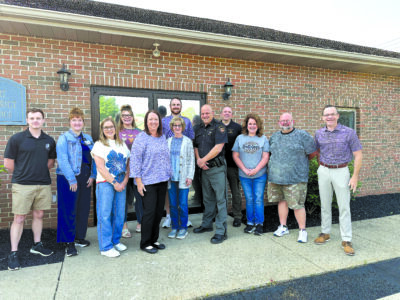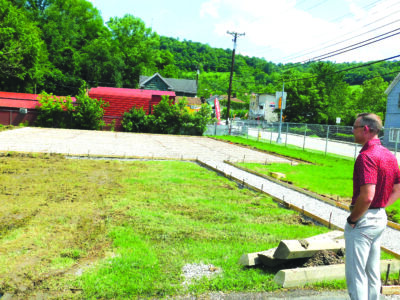Buckeye Local graduate on COVID-19 front lines

Photos Provided Figurski wears the protective gear required for her job at a COVID-19 testing site in Central New York.
LEAH FIGURSKI was fortunate to be formally hired for her first ‘adult’ job just a few weeks before she finished graduate school at Seton Hill University.
But, when your first job is in public health and a pandemic occurs, there’s not much of an adjustment period.
The 2012 Buckeye Local and 2016 West Liberty University graduate has realized that since she joined the staff of the Bassett Healthcare Network, which serves central New York state and is located in Cooperstown, as a physician’s assistant.
“I am (basically) brand new (to the job),” Figurski said. “I graduated last May and started working in the emergency room in October, so I’ve been here like six months and it’s been interesting to say the least.”
Figurski actually lives and works in Oneonta, which is a short drive south from Cooperstown.
“Our hospital (system) covers 5,600 square miles, so it’s a vast area of upstate New York,” Figurski said.
Figurski has found herself directly on the frontline of the coronavirus testing venue. She rotates between two different “convenient care” setups through the emergency room. She compared it to an urgent care type of setup.
“We’ve been pretty busy, administering a lot of tests,” Figurski said.
Basically, within reason, anyone who feels they should be tested can be tested, according to Figurski.
“Obviously, if someone stubs their toe, we’re not going to give them a test for COVID-19,” Figurski said. “We do have to follow parameters, but if a person’s family member has symptoms and is being tested and that person is worried, they can be tested. If an employer believes an employee has a symptom, they can be tested. (The testing) is a little more lax than it was in the beginning.”
Similar to what’s being done in the Ohio Valley, the testing is done in a drive-thru format. However, the patients must set up an appointment.
“All patients must call our ‘COVID line’ which is manned by a nurse, who takes down the symptoms and what’s going on,” Figurski said. “If it’s critical, we can get them into an emergency room. But if the person can wait, the appointment (for a test) will be scheduled.”
Once the patient arrives at the testing site, he or she is given a health assessment by Figurski or another staff member.
“We look at vitals, listen to the heart and lungs and look in the throat to determine whether they need tested for COVID-19, flu, etc.,” Figurski said. “The hospital is trying to prevent anyone with a fever or respiratory condition in the clinic, so we’re seeing people with weird symptoms. You really never know what you’re going to see.”
New York — specifically New York City — has been one of the nation’s hardest hit areas for COVID-19. Figurski, however, is nearly a four-hour drive from the Big Apple in Ostego County, which hasn’t felt the effects of the coronavirus quite as drastically.
“We’re significantly lower than down-state New York,” Figurski said. “Our county has only had 62 confirmed cases, and Jefferson County (which borders Ostego Co.) has had fewer than 60 confirmed cases.”
Figurski compares the area to the Ohio Valley because it’s relatively rural, which she believes has helped to hold down the number of COVID-19 cases.
“Having people and things spread out has definitely helped us,” Figurski said.
Early on in the pandemic, as the numbers in New York City continued to swell, the hospital system was being put on notice that it could have patients from NYC transferred to the area, but according to Figurski, those patients ended up being sent to the Albany area.
Since the county was given the go-ahead to resume performing elective surgeries, all patients are pre-screened and must go through the testing center at which Figurski is stationed.
“Since that decision on the elective surgeries, our number (of tests administered) has gone up astronomically,” Figurski said.
Though she entered the profession of health care knowing it would come with certain risks, Figurski admits there are still some nervous moments during the entire process.
“We’ve really got the process down to a science, but the nerve-wracking part is when you do the screening, ask the usual questions and then you see the patient in the clinic for something they forgot to tell the nurse about. It’s the things that you’re not prepared for that are the most nerve-wracking.”
Figurski has not undergone a test for COVID-19 herself, but her employer is planning to begin serology testing on staff to check for antibodies.




